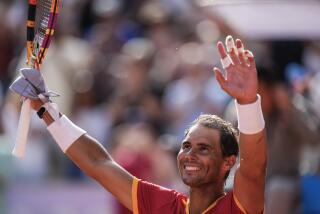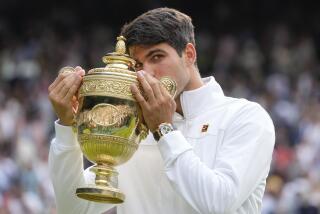Rafael Nadal now has a full place setting, and a place in tennis history
- Share via
From New York
The changing of the guard has arrived in men’s tennis. We have moved from the Swiss Surgeon to the Spanish Assassin.
In a U.S. Open that carried on for 15 days, through heat and wind and rain, threatening to never end, Rafael Nadal put the perfect finishing touch on the proceedings. At 10:10 p.m. EDT, he held the winner’s trophy over his head in a manner that made it clear that this was more than just another piece of tennis hardware.
“It is what I dreamt,” he said, his broken English increasingly endearing.
He had never won a U.S. Open, and now he had. He was seeking a high place in tennis history, and now he had it. He became the seventh man — after Fred Perry, Don Budge, Roy Emerson, Rod Laver, Andre Agassi and Roger Federer — to win each Grand Slam tournament at least once. He also joined the Agassi family, Andre and wife Steffi Graf, as the only winners of all four majors and an Olympic gold medal.
For once, it would be fair to assume that a trophy meant more to a tennis player than the $1.7-million winner’s check that went with it.
Perhaps adding to the moment was that it hadn’t come easily. Nadal, the pride of Mallorca and all corners of Spain, beat Novak Djokovic, who made Serbia proud, too. His 6-4, 5-7, 6-4, 6-2 defeat by Nadal took 3 hours 43 minutes, not including a 1-hour 48-minute rain delay, and featured the best Djokovic had to give.
“You just have to congratulate him and tell him, you’re better,” Djokovic said. “. . . It was a very good performance from my side. But whenever it was important, he was the one who was playing just too good.”
The last three words sum up Nadal. He was just too good.
This was his ninth major title and he is only 24. It was his third straight major title, won on clay, grass and hard courts. He has converted a game built for clay into one for all surfaces. He has brought an upgraded work ethic and mental toughness to a game that makes millionaires of coasters and flakes.
He is the new sheriff in town.
Federer is 29 and won the only major this year that Nadal did not, the Australian. Federer, who relinquished the No. 2 spot in the rankings to Djokovic when he lost to him in Saturday’s five-set semifinal, represents the next hill for Nadal to climb, his record 16 majors. The five years that separate the two represent 20 more Grand Slam chances for Nadal.
Federer, for so long the can’t-miss Swiss, remains competitive, but Nadal is now the relentless one. He is the itch you can’t scratch, the wall you hit against as a kid. The ball always came back, and so it does from Nadal.
Against the feisty, fighting Serb, who was spurred on by a surprisingly supportive capacity crowd of 23,771 in Arthur Ashe Stadium, Nadal took three minutes to break service and three full sets to finally break Djokovic down. Serving at 5-4 in the third set, Nadal hooked an unreturnable serve out wide at 101 miles an hour at 15-30. Then came a 126 ace and the same hook wide, this time at 103, to win the set.
Djokovic looked like a man just hit by a bus. He said later, “I had this 15-30 chance in the 5-4 third set, and then he served, I mean, three amazing serves.”
The next few years will be interesting in both the pursuit of major titles and the focus on who Nadal really is. His intense look on the court belies an inner boy scout. He is the player most likely to help a little old lady across the street. He was raised right, and his uncle Toni Nadal travels with him to make sure he doesn’t get off track. Wins are important. Common courtesy more so.
After his semifinal match on Sept. 11, he told the crowd how sad he still was about the terrorist attacks. He said later he has visited Ground Zero six times. Once is a photo op. Six times is heartfelt.
Tennis fan Bob Drew tells of seeing Nadal as an unheralded youngster, playing at Wimbledon. A ball boy was hit with a shot and Nadal made the chair umpire stop the match, something veterans would be hesitant to do. “That kid is bleeding,” he said.
In his news conference Monday, he was asked to rank his top moments. He ignored his career and said, “When Spain won the World Cup, I cried.”
He has become charming in a language with which he still struggles. His interviews bring shrugs, smiles and deflection of media attempts to put the pedestal high. About Federer, he says, “Sixteen [major titles] is too far.”
A defining moment in a night of so many occurred as the awards ceremony was ending. Nadal was posing for the on-court photographers, Djokovic was departing and the public address announcer asked for one more round of applause. Nadal stopped posing and, trophy in arms, joined the applause.
You can see hundreds of similar ceremonies. You won’t see that.
bill.dwyre@latimes.com
More to Read
Go beyond the scoreboard
Get the latest on L.A.'s teams in the daily Sports Report newsletter.
You may occasionally receive promotional content from the Los Angeles Times.











